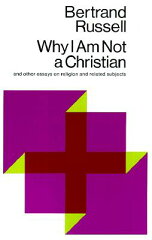Preface to Why I am not a Christian and Other Essays on Religion and Related Subjects, 1957, by Bertrand Russell
 Bertrand Russell Quotes 366 |
There has been a rumour in recent years to the effect that I have bccome less opposed to religious orthodoxy than I formerly was. This rumour is totally without foundation. I think all the great religions of the world - Buddhism, Hinduism, Christianity, Islam, and Communism - both untrue and harmful. It is evident as a matter of logic that, since they disagree, not more than one of them can be true. With very few exceptions, the religion which a man accepts is that of the community in which he lives, which makes it obvious that the influence of environment is what has led him to accept the religion in question. It is true that Scholastics invented what professed to be logical arguments proving the existence of God, and that these arguments, or others of a similar tenor, have been accepted by many eminent philosophers, but the logic 'to which these traditional arguments appealed is of an antiquated Aristotelian sort which is now rejected by practically all logicians except such as are Catholics. There is one of these arguments which is not purely logical. I mean the argument from design. This argument, however, was destroyed by Darwin; and, in any case could only be made logically respectable at the cost of abandoning God's omnipotence. Apart from logical cogency, there is to me something a little odd about the ethical valuations of those who think that an omnipotent, omniscient, and benevolent Deity, after preparing the ground by many millions of years of lifeless nebulae, would consider Himself adequately rewarded by the final emergence of Hitler and Stalin and the H-bomb.
The question of the truth of a religion is one thing, but the question of its usefulness is another. I am as firmly convinced that religions do harm as I am that they are untrue.
|
| |
|
これをアマゾンで購入 |
The above evils are independent of the particular creed iu question and exist equally in all creeds which are held dogmatically. But there are also, in most religions, specific ethical tenets which do definite harm. The Catholic condemnation of birth-control, if it could prevail, would make the mitigation of poverty and the abolition of war impossible. The Hindu beliefs that the cow is a sacred animal and that it is wicked for widows to remarry cause quite needless suffering. The Communist belief in the dictatorship of a minority of True Believers has produced a whole crop of abominations.
We are sometimes told that only fanaticism can make a social group effective. I think this is totally contrary to the lessons of history. But, in any case, only those who slavishly worship success can think that effectiveness is admirable without regard to what is effected. For my part, I think it better to do a little good than to do much harm. The world that I should wish to see would be one freed from the virulence of group hostilities and capable of realising that happiness for all is to be derived rather from co-operation than from strife. I should wish to see a world in which education aimed at mental freedom rather than at imprisoning the minds of the young in a rigid armour of dogma calculated to protect them through life against the shafts of impartial evidence. The world needs open hearts and open minds, and it is not through rigid systems, whether old or new, that these can be derived.
BERTRAND RUSSELL


